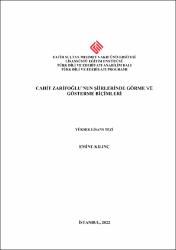Cahit Zarifoğlu’nun Şiirlerinde Görme ve Gösterme Biçimleri
Citation
KILINÇ, Emine, Cahit Zarifoğlu’nun Şiirlerinde Görme ve Gösterme Biçimleri, Fatih Sultan Mehmet Vakıf Üniversitesi Lisansüstü Eğitim Enstitüsü Türk Dili ve Edebiyatı Anabilim Dalı Türk Dili ve Edebiyatı Programı,Yayımlanmamış Yüksek Lisans Tezi, İstanbul 2022.Abstract
Modern Türk şiirinin önemli şairlerinden biri olan Cahit Zarifoğlu’nun şiirlerinin merkezini görme eylemi oluşturmaktadır. Şairin şiirlerinin merkezinde olduğu düşünülen görmenin, şiirin sentaktik düzeyinden semantik düzeyine şiiri içerik-yapı olarak bütünleştiren bir matris işlevi yüklendiği görülür.
Zarifoğlu’nun şiirlerinde görme biçimleri hem şiirde görme ve görsellik ilişkisinin belirleyeni hem de bu ilişkinin sonucu olarak ortaya çıkar. Şiirlerde görmeden görülmeye doğru bir yol izlendiği ve bu izleğin Zarifoğlu’nun şiirlerinin genel karakterini belirlediği görülmektedir. Şiirler; görme, görsellik ve görselleştirme ile ilgili kullanımlar aracılığıyla merkezdeki görme eylemine yapısal ve anlamsal olarak bağlanırken şiir atmosferi, görmenin farklı boyutlarda gerçekleştiği bir görme perdesine dönüşür.
Zarifoğlu’nun şiirlerinde görme, modern Türk şiirinin genelinde olduğu gibi merkezî perspektifin penceresinden gerçekleşmez. Zarifoğlu şiirini modern Türk şiiri içinde farklı kılan, görmenin mutlak biçiminin merkezî perspektif olduğu iddiasını taşıyan görme ve düşünme biçimlerini reddetmesidir. Zarifoğlu şiirinin bu noktada hem İslâm düşüncesi ve sanatlarında görülen hem de modern ve modern sonrası sanat anlayışlarının ulaşmaya çabaladığı “çoklu bakış”a ya da “tersten perspektif”e dayanan bir görme biçimi ile şekillendiği görülmektedir.
Görenin görünen dünyaya bir görülen olarak katıldığı Zarifoğlu şiiri, görmeyi yeniden öğrenme tecrübesi olarak bir seyir hâlidir. Bu seyir, görmenin yalnızca görme organı olan göz ile ilişkili olmadığı, görmede hakikate ulaşmanın kalbin görmeye açılmasıyla mümkün olacağı idraki ile şekillenen, görme bilgisinin görme bilincine dönüştüğü bir süreçtir. Bu anlamıyla Zarifoğlu şiiri, İslam düşüncesi ve sanatlarının görme biçimini modern ve modern sonrası sanatın yönelimleri ile yeniden görmeye açan bir görme poetikası olarak düşünülebilir. Bu çalışmada, Zarifoğlu’nun şiirlerinde görme ve gösterme biçimleri, şiirlerde görme ve görsellik ilişkisinin belirleyeni ve sonucu olarak değerlendirilmeye çalışılmıştır. The act of seeing the center of the poems of Cahit Zarifoğlu, one of the important poets of modern Turkish poetry. It is seen that sight, which is thought to be at the center of the poet's poems, is loaded from the syntactic level to the semantic level of the poem as a matrix function that integrates the poem as content-structure.
The ways of seeing in Zarifoğlu's poems emerge both as the determinant of the relationship between vision and visuality in poetry and as a result of this relationship. It is seen that a path from seeing to being seen is followed in poems and this theme determines the general character of Zarifoğlu's poems. Poetry; while seeing is connected structurally and semantically to the act of seeing in the center through the uses related to vision, visuality and visualization, the atmosphere of poetry turns into a visual screen where seeing takes place in different dimensions.
Seeing in Zarifoğlu's poems does not occur from the window of a central perspective, as is the case in modern Turkish poetry in general. What makes Zarifoğlu's poetry different in modern Turkish poetry is its rejection of the ways of seeing and thinking, which claim that the absolute form of seeing is the central perspective. At this point, it is seen that Zarifoğlu's poetry is shaped by a way of seeing that is based on "multiple perspective" or "reverse perspective", which is seen both in Islamic thought and arts and which modern and post-modern artistic understandings strive to achieve.
Zarifoğlu's poem, in which the seer joins the visible world as seen, is a state of journey as an experience of re-learning to see. This journey is a process that is shaped by the cognizance that seeing is not only related to the eye, which is the organ of vision, but that reaching the truth in seeing will be possible by opening the heart to seeing and vision information turns into vision consciousness. In this sense, Zarifoğlu's poetry can be considered as a poetics of seeing that reopens the Islamic thought and arts’s way of seeing to sight with the tendencies of modern and post-modern art. In this study, the ways of seeing and showing in Zarifoğlu's poems are tried to evaluate as result and determiner of relation of seeing and visuality in poems.



















